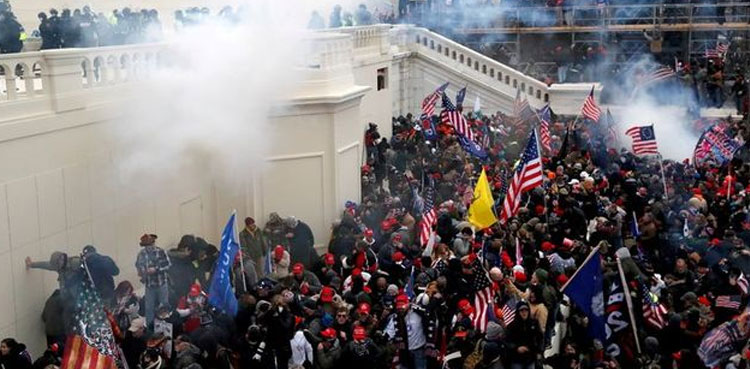
President Donald Trump on Monday pardoned nearly everyone criminally charged with participating in the Jan. 6, 2021, attack on the US Capitol, in a show of solidarity with supporters who stormed the seat of American power in his name.
The act effectively wipes away legal consequences for all but 14 of the nearly 1,590 people charged over the riot. The exceptions, members of the far-right Proud Boys and Oath Keepers organizations, had their sentences ended early and will be released from federal prison.
Trump also directed the U.S. attorney general to drop all pending cases related to the riot.
“These people have been destroyed,” Trump, a Republican, said shortly after returning to the Oval Office for the first time since the end of last year. “What they’ve done to these people is outrageous.”
The moves fulfill a campaign promise by Trump to aid supporters who were charged and in many cases imprisoned for crimes committed during the riot, a failed attempt to stop the congressional certification of Democrat Joe Biden’s 2020 election victory.
A White House proclamation called the investigation into the riot a “grave national injustice” and said the pardons would begin a “process of national reconciliation.”
Some federal inmates serving Jan. 6-related sentences could be released as soon as Monday, a Bureau of Prisons spokesperson said.
Thousands descended on the Capitol in 2021 following an incendiary speech by Trump, tearing down barricades, fighting police and sending lawmakers and Trump’s vice president Mike Pence running for their lives as they met to formalize the election result.
The list of pardon recipients include Enrique Tarrio, the former leader of the Proud Boys, who was sentenced to 22 years for seditious conspiracy, the longest of anyone criminally charged in the riot. Tarrio was found guilty of plotting to violently oppose the transfer of power after the 2020 election.
Others pardoned include people convicted of using pipes, poles and chemical spray to assault the police officers who guarded the Capitol Hill. About 140 law enforcement officers were injured in the violence.
Four people died during the chaos, including a Trump supporter who was shot dead by police. Five police officers died of various causes after the attack.
Stewart Rhodes, the former leader of the Oath Keepers militia, was not pardoned, but had his 18-year prison sentence commuted and is set to be released.
Other members of the Proud Boys and Oath Keepers also had their sentences cut short. Prosecutors accused both groups of mobilizing for violence after Trump lost the 2020 election and playing a leading role in instigating the breach of the Capitol.
Grant Tudor, a policy advocate at the advocacy group Protect Democracy, said the pardons sent the message that “if you engage in violence on behalf of the cause, Trump will protect you.”
Read more: Capitol Attack: Trump supporter, ‘Proud Boys’ leader handed 22 years
“These pardons will license future lawbreaking, including violence,” Tudor said.
PARDONS, COMMUTATIONS
More than 600 people were charged with assaulting or obstructing police during the riot, according to U.S. Justice Department figures.
The presidential clemency power includes the ability to remove legal consequences of a conviction through a pardon or to cut short or modify a sentence through a commutation.
The U.S. Constitution gives presidents broad pardon power and there is no legal mechanism for challenging a presidential pardon.
Key Trump allies in recent weeks said they did not expect pardons of people who engaged in violence.
Likewise, Vice President JD Vance in an interview with Fox News earlier this month said, “If you committed violence on that day, obviously you shouldn’t be pardoned.”
AN EXTRAORDINARY COMEBACK
Trump’s decision ends what officials have called the largest investigation in the Justice Department’s history. The FBI and federal prosecutors spent the last four years tracking down and charging people they said participated in a violent attempt to stop the transfer of power after Trump lost the 2020 election.
Trump’s grants of clemency are another indication of his extraordinary political comeback. In the days following the riot, Trump was condemned by his fellow Republicans, banished from prominent social media sites and impeached by the House of Representatives, though he was later acquitted by the Senate.
Trump also faced criminal charges over his efforts to undo his 2020 election loss, a case that sought to hold him responsible for the violence at the Capitol. The charges were dropped after Trump won last year’s election.
Charges against Capitol riot defendants ranged from low-level trespassing offenses to seditious conspiracy against the leaders of the Proud Boys and Oath Keepers groups, who were found to have plotted to use violence to stop the transfer of power.
More than 1,000 people pleaded guilty to federal charges, including 327 who admitted to felonies and 682 who committed misdemeanor offenses. A further 221 were found guilty following a trial, according to Justice Department figures.
About 1,100 were sentenced, including 667 defendants who were sent to prison, according to the data.
Trump’s move came after Biden made aggressive use of the pardon power in his final weeks as president. He pardoned his son, Hunter, who had been convicted on gun and tax charges, and later other members of his family.
Biden on Monday issued preemptive pardons for some top targets of Trump and his supporters including Mark Milley, former chairman of the Joint Chiefs of Staff, and members of the congressional panel that investigated the Capitol riot.
from International News Today - Breaking News, US News, World News https://ift.tt/L7EObUB
via IFTTT